Mental Models
Mental Models Help You Think Effectively
A Mental Model Is A High Level Overview Of How Something Works
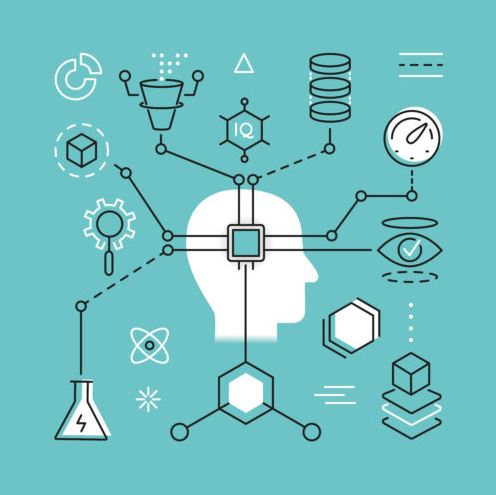
Mental Models - Overview
Mental models are high level representations of how thing work.
They help you think effectively and thus are fully aligned with the objectives and purpose of this site.
According to Charlie Munger:
Munger is referring here to mental models.
Two broad categories of mental models that are particularly useful are those that help us understand how:
[1] The world works and thus to predict the future.
[2] To see connections and opportunities
Our world is multi-dimensional and our problems are complex. Most problems cannot be solved using one model alone, thus it follows that the more models you have in the toolkit, the better equipped you will be to solve your problems because you can look at the problem from a variety of perspectives and increase the odds that you will come to a better solution.
But if you don’t have the models, you become the proverbial man with a hammer to whom every problem looks like a nail.
Another important
consideration is how you prioritise your learning. Trying to keep
up-to-date with all the latest information will lead to us chasing our
tails, therefore Charlie Munger says that we should focus on things that
change slowly:
Latticework Of Mental Models
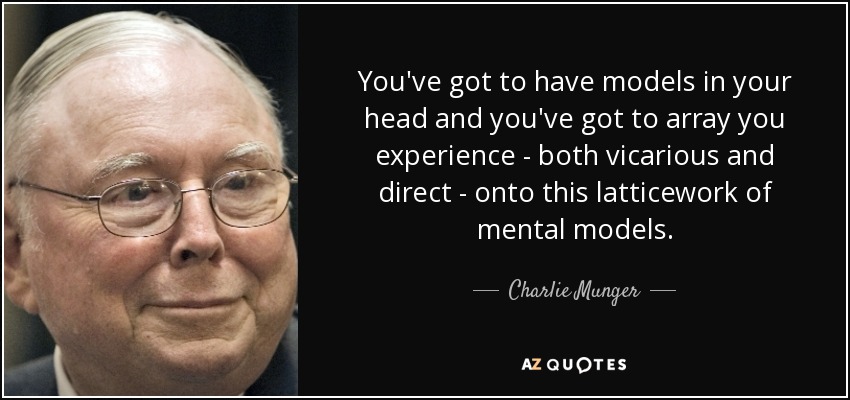
Since it is impossible to keep all of the details of all of the information that you absorb in your brain, you use models to simplify the complex into understandable and organisable chunks.
Mental models shape how you reason and how you understand, and they also shape the connections and opportunities that you see, and also why you consider some things more relevant than others.
The quality of your thinking processes is proportional to the models in your head and their applicability to the situation under consideration.
The more models you have the better quality will be your thinking processes and decision making ability, however most people are specialists.
- Many people know a little about a little.
- Most people with training and skills in a particular discipline or scope of proficiency know a lot about a little.
- The person with a latticework of mental models knows a little about a lot.
- The serious thinker has a latticework of mental models that enable him/her to know a lot about a lot.
“You don’t have to know everything. A few really big ideas carry most of the freight.”
"It’s kind of fun to sit there and out-think people who are way smarter than you are because you’ve trained yourself to be more objective and more multidisciplinary. Furthermore, there is a lot of money in it, as I can testify from my own personal experience."
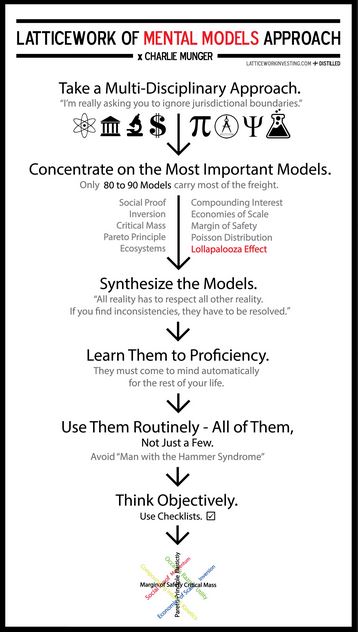
Charlie Munger: Adding Mental Tools to Your Toolbox
How To Prioritise Learning Mental Models
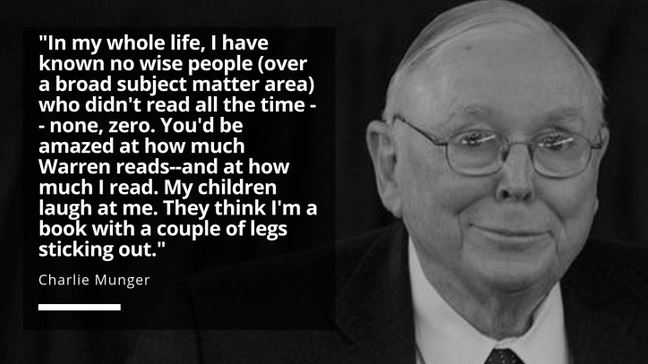
- Get back to basics. Understanding a simple idea deeply, creates more lasting knowledge and builds a solid foundation for complex ideas later.
- Build your foundation. Take the time to do a Feynman One Pager on an idea you think you know really well. While easy, this process will reveal any gaps you have in your knowledge.
- The multidisciplinary mind understands the basic ideas. You don’t need to understand the latest study in biology, but you sure as heck better understand the concept of evolution because it applies to so much more than animals.
- Understanding the basics allows us to predict what matters. Put simply, people who understand the basics are better at understanding second and subsequent order consequences.
- What has been will continue to be. The longer a technology lives, the longer it can be expected to live.
- Time can predict value. While produce and humans have a mathematical life expectancy that decreases with each day, some things, like books, increase in life expectancy with each passing day.
Further reading:
In the words of Charlie Munger:
How Do Mental Models Align With The Themes Of This Site?
The purpose of this site is to show you how to cope in tough times, and to provide you with the tools to do this successfully. Mental models are an integral part of all this. Here is how it all hangs together.
FULL LISTING - Mental Models
Mental Models: The Best Way to Make Intelligent Decisions (109 Models Explained)
Mental Models - Resources
Mental Models - General Thinking Concepts
What Is Truth - How To Tell A Partial Truth From The Whole Truth?
The Metagame Approach to Second-Order Thinking - 5 Guiding Principles
The Power Of Opposite Thinking
Iatrogenics - "Do Something Syndrome"
How To Make Better Decisions - By Avoiding The Narrative Trap
Mental Models - Human Nature
Why You Should Embrace Anomalies
Mental Models - Productive Thinking
Applied Rationality and The Scout Mindset
Less Is More - Subtractive Solutions
The Challenges Of The Road Less Traveled
Discernment - Exercising Good Judgement
How To Make Better Decisions - By Avoiding The Narrative Trap
The ETTO Principle - Why Near Enough Can Be Good Enough
Outcome Over Optics - Long Game Outcomes Over Short-Term Ego Gains
Mental Models - Physics, Chemistry & Biology
Mental Models - Systems
Mental Models - Numeracy
Food For Thought: Using Models to Stay Calm in Charged Situations
Return from "Mental Models" to: How To Think
LATEST ARTICLES
Dealing With Distraction - Learning How To Live With Your "Attention Autopilot"
 Living With Your Attention Autopilot The good news about your Attention Autopilot is that it will keep you safe. It is continuously scanning your immediate environment for threats. The bad news is tha…
Living With Your Attention Autopilot The good news about your Attention Autopilot is that it will keep you safe. It is continuously scanning your immediate environment for threats. The bad news is tha…The Time Of Your Life - Recognising Moments Of Alignment For Action
 How will you recognise your moment of alignment for action? In this article I want to look at our relationship with time and in the context of the two main themes of this site, firstly as a thinking s…
How will you recognise your moment of alignment for action? In this article I want to look at our relationship with time and in the context of the two main themes of this site, firstly as a thinking s…The Metagame Approach to Second Order Thinking - 5 Guiding Principles
 How To Position Yourself For Survival & Success In A Complex Environment We treat life as though it is a complicated system, and our thinking skills and mental models are focused on understanding its…
How To Position Yourself For Survival & Success In A Complex Environment We treat life as though it is a complicated system, and our thinking skills and mental models are focused on understanding its…Outcome Over Optics - Long Game Outcomes Over Short-Term Ego Gains
 The Day I Learned To Focus On Outcome Over Optics I have never forgotten the day I learned to focus on outcomes over optics and figured out a very simple way of saving myself several hundred thousand…
The Day I Learned To Focus On Outcome Over Optics I have never forgotten the day I learned to focus on outcomes over optics and figured out a very simple way of saving myself several hundred thousand…The ETTO Principle - Why Near Enough Can Be Good Enough
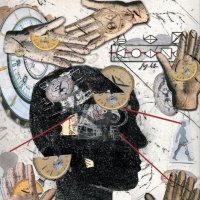 How To Balance the Efficiency-Thoroughness Trade Off The ETTO Principle describes the inherent trade-off between working efficiently and working thoroughly. This trade-off is something that affects…
How To Balance the Efficiency-Thoroughness Trade Off The ETTO Principle describes the inherent trade-off between working efficiently and working thoroughly. This trade-off is something that affects…Master The Art Of Drawing The Bow
 Focus On Process Not Outcome In so many areas of our lives, we focus on the outcome, not the process that we follow to achieve it. In the western world, we are conditioned to pay less attention to how…
Focus On Process Not Outcome In so many areas of our lives, we focus on the outcome, not the process that we follow to achieve it. In the western world, we are conditioned to pay less attention to how…And So This Is Christmas
 There Is No Path To Peace - The Path Is Peace Thich Nhat Hanh, the renowned Vietnamese Zen Buddhist monk, teacher, and peace activist, often spoke about peace as a state of being that begins within on…
There Is No Path To Peace - The Path Is Peace Thich Nhat Hanh, the renowned Vietnamese Zen Buddhist monk, teacher, and peace activist, often spoke about peace as a state of being that begins within on…Curiosity Skilled The Cat - Optimize For Interesting
 Curiosity Fuels Excellence The old adage, “Curiosity killed the cat,” warns of the dangers of venturing too far into the unknown. But what if we reimagine it not as a risk but as a gateway to developi…
Curiosity Fuels Excellence The old adage, “Curiosity killed the cat,” warns of the dangers of venturing too far into the unknown. But what if we reimagine it not as a risk but as a gateway to developi…Let Stillness Speak - Living Within A Complex System
 To let stlllness speak is to learn it's first major lesson: you are not your thoughts. To let stillness speak is about stepping back from the constant chatter of your mind and allowing a deeper, quiet…
To let stlllness speak is to learn it's first major lesson: you are not your thoughts. To let stillness speak is about stepping back from the constant chatter of your mind and allowing a deeper, quiet…Understanding Complex Systems Thinking - It's Not Complicated
 Understanding, and being able to work with, complexity is an important thinking skill.
We are all working with complex systems, and we do so every day. The biggest one is life itself. We automaticall…
Understanding, and being able to work with, complexity is an important thinking skill.
We are all working with complex systems, and we do so every day. The biggest one is life itself. We automaticall…Stay On The Bus - When To Keep On Going
 The Helsinki Bus Station Theory
Have you ever started a new project, initiative or role with a big vision and a determination to make a difference? Initially you were full of enthusiasm and highly mo…
The Helsinki Bus Station Theory
Have you ever started a new project, initiative or role with a big vision and a determination to make a difference? Initially you were full of enthusiasm and highly mo…Zen Thoughts Email Series
 Conversations With A Friend Zen Thoughts is an email series of 50 short messages spread over 3 months. The messages are written in the style of a conversation with a friend who is going through a toug…
Conversations With A Friend Zen Thoughts is an email series of 50 short messages spread over 3 months. The messages are written in the style of a conversation with a friend who is going through a toug…How to Get What You Value by Changing What You Measure
 Give Up Control & Gain Influence To Get What You Want
The metrics we choose to focus on can significantly shape our outcomes, sometimes in ways we don't intend. The challenge is to make sure that you…
Give Up Control & Gain Influence To Get What You Want
The metrics we choose to focus on can significantly shape our outcomes, sometimes in ways we don't intend. The challenge is to make sure that you…How to Become A Master At Overcoming Hard Moments
 "The best in the world are not the best because they win every point. It's because they lose again and again and have learned how to deal with it." This quote from Roger Federer has got a lot of cover…
"The best in the world are not the best because they win every point. It's because they lose again and again and have learned how to deal with it." This quote from Roger Federer has got a lot of cover…Drop The Story - Deal With Your Demons and Transform Your Experience
 Are you living your life from the stories you tell yourself? Learning how to drop the story and deal with that voice in your head can be a game changer. When you can do this you will have a powerful t…
Are you living your life from the stories you tell yourself? Learning how to drop the story and deal with that voice in your head can be a game changer. When you can do this you will have a powerful t…


